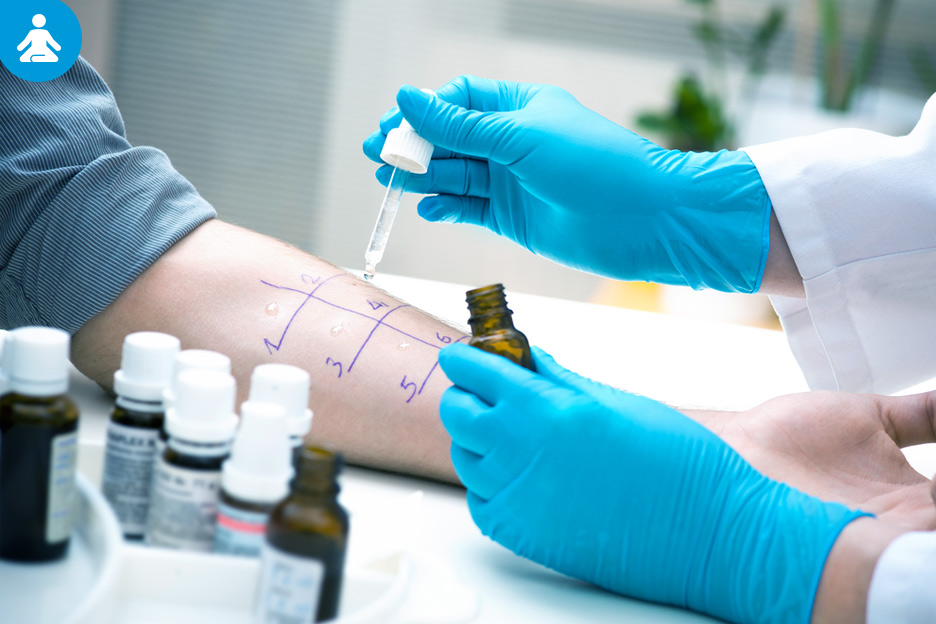What do peanuts, wasps, and penicillin have in common? All three can trigger a serious allergic reaction such as anaphylaxis, which requires immediate medical attention. Would you be prepared to deal with such a reaction?

Anaphylaxis: what is it?
A serious allergy, or anaphylaxis, is an abnormal reaction by the immune system to the presence of a trigger, also called an allergen. The immune system perceives it (often mistakenly) as undesirable and dangerous and releases chemicals to protect the organism against this “threat.” This sets off an excessive and generalized reaction, which affects several of the body’s biological systems, develops quickly, and can even be fatal in more severe cases.
The signs and symptoms of anaphylaxis include the following:
- generalized redness of the skin often accompanied by significant itching;
- a metallic taste or itching in the mouth;
- swelling of the throat, lips, and tongue, which can lead to difficulty in speech or breathing;
- a sudden drop in blood pressure accompanied by an increased heart rate;
- paleness and a sudden sensation of weakness;
- dizziness and loss of consciousness.
Symptoms can appear in the minutes or hours following exposure to an allergen. In very little time, the reaction can become potentially fatal. It sometimes takes place in two steps, with a second reaction appearing up to 36 hours after the first.
What are the triggers?
A number of substances can trigger allergic reactions, but serious allergies are most often caused by:
- foods or food substances and additives: peanuts, nuts, milk, soya, eggs, sesame, fish, seafood, wheat, mustard, gluten, lactose, sulphites, or food colouring;
- medications: beta-lactam antibiotics (including penicillin), intravenous anaesthetics, opioid analgesics (morphine and its derivatives), aspirin, and non-steroidal anti-inflammatory drugs;
- insect stings and bites (bees, wasps, hornets, and certain types of ants);
- latex; and
- physical exercise.
However, it is possible for the cause of a serious allergic reaction to be unidentified. This is known as idiopathic anaphylaxis.
How to prevent anaphylaxis?
There is currently no drug or medical treatment to cure an allergy. The only way to avoid serious allergic reactions is to eliminate any exposure to offending allergens. And this is not easy! On the other hand, everything must be done to achieve this goal.
To do this, food, cosmetics, supplements, as well as natural and homeopathic product labels must always be checked carefully. It is important to always tell healthcare professionals, especially your pharmacist, about any allergy to a drug or its components.
What to do in case of anaphylaxis?
When there is a serious allergic reaction, it is important to react quickly. Epinephrine is the first line of treatment to neutralize anaphylaxis. It is sold as a self-injectable pen to facilitate its administration. Epinephrine must be used immediately after exposure to an allergen, as soon as symptoms appear, or even before that if you are sure of exposure. Then, you must go to the nearest emergency room without delay. The medical team will take charge of the patient for the rest.
A few tips
When you have a serious allergy or run the risk of anaphylaxis, it is important to:
- inform people around you about the allergy, including school staff or daycare workers if a child is involved;
- wear a bracelet, pendant, or something else indicating the allergy;
- always have within reach a self-injectable epinephrine pen within reach and keep a few handy at different locations;
- re-read the directions for use from time to time so that you will be able to use the self-injectable pen quickly when needed, without fumbling. It may be useful, at some point in time, to view a demonstration video on the product manufacturer’s website;
- ensure that the people close to you know how to use the self-injectable pen;
- regularly check the expiry date of the epinephrine and always keep the self-injectable pen within the temperature limits recommended by the manufacturer (most often between 15 and 30°C);
- never keep a self-injectable pen in a place that can be subject to extreme temperatures, such as a car;
- replace the self-injectable pen when the epinephrine has reached its expiry date. Your pharmacist can remind you about it. Feel free to ask for more information about this service.
Anaphylaxis is a medical emergency. When it occurs, immediate action must be taken. If you are a parent of a child with a serious allergy, you must sharpen your reflexes. Your pharmacist can prove to be a precious ally in the management of a serious allergy. Don’t hesitate to talk to your pharmacist. This will go a long way in ensuring your child’s safety!